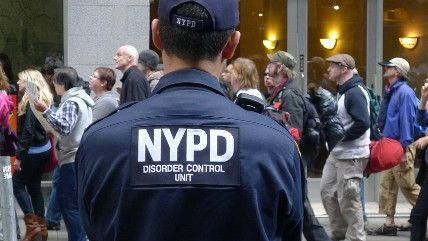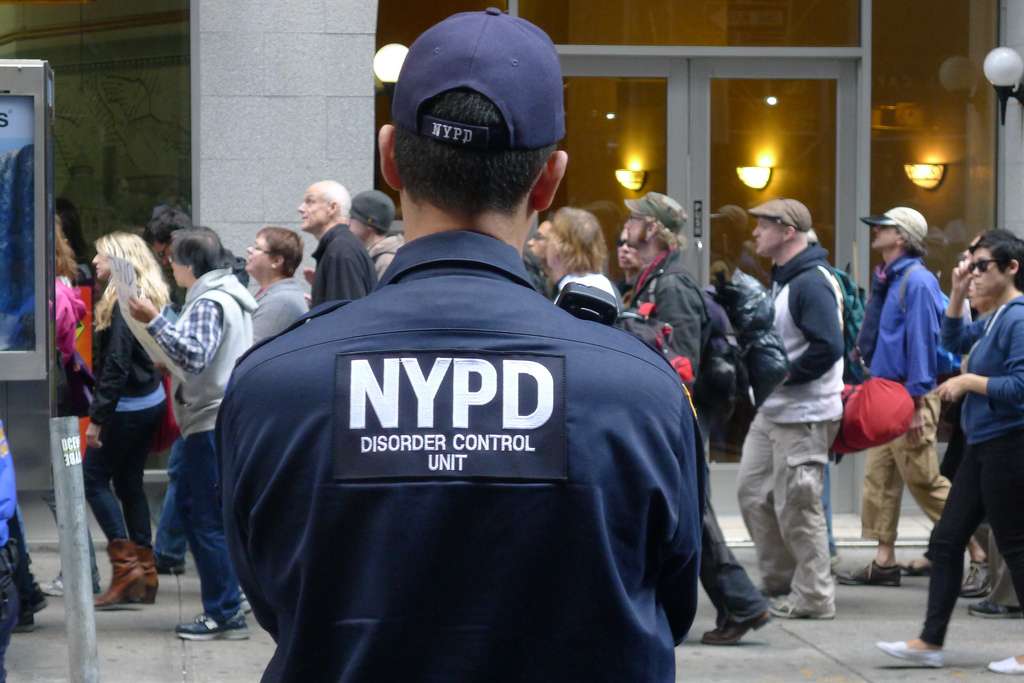Is NYPD's Police Union Ignoring Trial of Officer Who Killed Unarmed Akai Gurley?
Peter Liang dumped PBA-appointed lawyers, now the union is quiet during trial.

Writing in Gothamist, Max Rivlin-Nadler reports

that the trial of Peter Liang, the rookie NYPD officer who shot and killed unarmed 28-year-old Akai Gurley in the stairwell of a Brooklyn housing project in 2014, is being ignored by the Patrolmen's Benevolent Association (PBA).
Liang and his partner were patroling the stairwells of the Pink Houses housing project on November 20, 2014, in direct defiance of a superior officer's instructions to not patrol in "verticals." With his gun in one hand and a flashlight in the other, Liang was spooked by the sound of Gurley entering the stairwell from the floor below. Liang's lawyers are blaming the shooting on a defective trigger.
In the crucial moments following the shooting, Liang was "incoherent," "panicked," and more concerned that he was going to lose his job than he was in assisting the gravely wounded man he shot. During that time, he reportedly texted his union representative and neither he nor his partner could accurately provide the address of the building they were in.
These are all examples of indefensible behavior, one that any union interested in accountability would distance itself from. Rivin-Nadler's article correctly notes that PBA president Patrick Lynch "rarely misses an opportunity to grandstand" and that the lack of a stalwart union presence at Liang's trial presents a "stark difference from previous police misconduct trials, where the PBA has put itself directly in the spotlight to broadcast its steadfast faith in the near total infallibility of police officers."
Rivlin-Nadler then suggests the lack of a union presence might have something to do with the fact that Liang is Asian-American:
The PBA's lack of support has created a perception among Liang's supporters that the city's largest police union would not be treating a white police officer accused of the same crimes in this manner. After a grand jury declined to indict NYPD Officer Daniel Pantaleo for fatally choking Staten Island resident Eric Garner, Pat Lynch called Pantaleo "the model of what we want a police officer to be."
Asians make up 6% of the NYPD, while they make up 13% of New York City's population. Almost 85% of NYPD leadership are white.
But Liang himself turned away from the union when he dismissed his PBA-provided lawyers last November after refusing to testify before a grand jury (as is the preference of police union attorneys), as well as his somewhat unusual decision to opt for a jury trial rather than a bench trial.
DNAInfo New York wrote last month:
His decision to opt for a juror trial is unusual. Police officers generally believe that a judge can remain dispassionate about the case, and that they have a better understanding of an officer's job and the subtleties of their regulations.
Prosecutors introduced into evidence the NYPD Police Student's Guide, which Liang was trained with during his time in the police academy in 2013.
Liang's new lawyers pointed out a passage from the guide, which reads in part:
Criminals, alerted to your presence through sound, would have time to escape or devise a plan, as you unknowingly walk down the stairs, for a possible ambush.
There are plenty of "teachable" moments to be gleaned from Akai Gurley's tragic death. Training new officers to prepare for an ambush and then assigning them to one of the most violent crime-afflicted housing projects in the city are choices of policy. Liang and his partner's decision to ignore their supervisor's edict to avoid stairwell patrols was a choice of practice. Liang's decision to patrol in a stairwell with his finger on the trigger of a gun was the choice that ended Gurley's life, and that choice ultimately falls on him.


Show Comments (18)